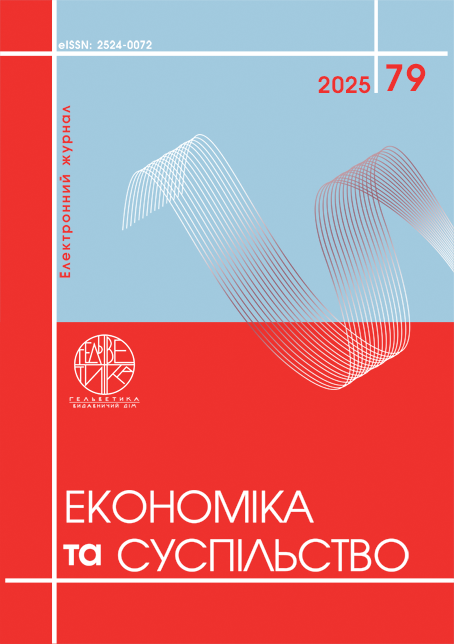ETHICAL COMPETENCE OF A MANAGER AS A CONFLICT MANAGEMENT TOOL: ONTOPYSHOLOGICAL AND COMMUNICATIVE APPROACHES
Abstract
This article investigates the ethical competence of managers as a key instrument for conflict management and the regulation of professional behavior within enterprises, emphasizing the integration of ontopsychological and communicative approaches. Ethical leadership is highlighted as a vital factor in shaping organizational culture, minimizing workplace conflicts, and ensuring sustainable employee engagement. The ontopsychological approach offers insights into the leader’s internal integrity, emotional maturity, and awareness, enabling deeper understanding of the psychological roots of conflict, while the communicative approach focuses on the ability to foster constructive dialogue, build trust, and maintain open communication channels across the organization. The study explores formal and informal components of ethical infrastructure (including codes of ethics, ethical training systems, feedback mechanisms, and informal behavioral norms) and how these elements contribute to the establishment of an ethical and psychologically safe workplace environment. It is argued that a leader’s personal example, moral consistency, and empathy significantly influence employees’ behavior and create a culture of responsibility, respect, and cooperation. The research identifies key challenges in the modern macroeconomic environment that complicate ethical behavior management, such as instability, digital transformation, and changing values. In response, the article proposes a comprehensive organizational and economic toolkit that supports the implementation of ethical standards and enhances leadership effectiveness. This toolkit enables managers to regulate professional behavior proactively, reduce conflict intensity, and align employee actions with corporate values. The article concludes that ethical competence is not only a personal trait but also a strategic managerial capability that enhances the efficiency of human resource management, strengthens internal organizational coherence, and contributes to achieving long-term organizational success in today’s complex business environment.
References
Жавела К. А., Жавела А. К. Сучасні концепції та інноваційні технології в системі управління персоналом. Економічна наука. Інвестиції: практика та досвід. 2019. No 22. С. 73 – 78.
Дворник І., Дворник О., Гарафонова О. Сучасна стратегія управління персоналом підприємства в умовах воєнного стану. Modeling the development of the economic systems. 2023. No 2. С. 144–152.
Овчиннікова В. О., Дьяков М. І., Висоцька О. Ю. Формування системи розвитку людського капіталу в умовах трансформацій. Вісник економіки транспорту і промисловості. 2024. № 87. С. 66 – 72.
Михаліцька Н. Я., Яцик М. Р. Лідерство та комунікації в організації : навчальний посібник. Львів : Львівський державний університет внутрішніх справ, 2024. 512 с.
Чернобай Л. І., Дума О. І. Теоретичні основи ефективності керівництва підприємством. Бізнес-Інформ. 2018. № 8. С. 198-204.
Барабанов І.В., Андрєєва Т.Є., Гетьман О.О. Сучасний конфлікт-менеджмент: монографія. Харків: ФОП Панов А.М., 2019. 204 с.
Сєріков А.В. Управління організаційними змінами. Харків: «Бурун Книга», 2013. 264 с.
Яхно Т.П., Куревіна І.О. Конфліктологія та теорія переговорів: навчальний посібник. Київ: Центр учбової літератури, 2012. 176 с.
Менегетті А. Підручник з онтопсихології. Київ, видавництво "Онтопсихологія", 2016. 658 с.
Dvornik I., Dvornik O., Garafonova O. (2023) Suchasna stratehiia upravlinnia personalom pidpryiemstva v umovakh voiennoho stanu [Modern strategy of personnel management in enterprises under martial law]. Modeling the development of economic systems, no. 2, pp. 144–152. (in Ukrainian)
Zhavela K. A., Zhavela A. K. (2019) Suchasni kontseptsii ta innovatsiini tekhnolohii v systemi upravlinnia personalom [Modern concepts and innovative technologies in personnel management systems]. Economic science. investments: practice and experience, no. 22, pp. 73 –78. (in Ukrainian)
Ovchynnikova V. O., Dyakov M. I., Vysotska O. Yu. (2024) Formuvannya systemy rozvytku lyudsʹkoho kapitalu v umovakh transformatsiy [Formation of a system of human capital development in conditions of transformations]. Bulletin of the Economy of Transport and Industry. no. 87. рр. 66 – 72. (in Ukrainian)
Mykhalytska N. Ya., Yatsyk M. R. (2024) Liderstvo ta komunikatsiyi v orhanizatsiyi : navchalʹnyy posibnyk [Leadership and communications in organizations: a textbook]. Lviv: Lviv State University of Internal Affairs. 512 p. (in Ukrainian)
Chernobay L. I., Duma O. I. (2018) Teoretychni osnovy efektyvnosti kerivnytstva pidpryyemstvom [Theoretical foundations of the effectiveness of enterprise management]. Business-Inform. no. 8. рр. 198-204. (in Ukrainian)
Barabanov I.V., Andreeva T.E., Getman O.O. (2019) Suchasnyy konflikt-menedzhment: monohrafiya [Modern Conflict Management: Monograph]. Kharkiv: FOP Panov A.M.. 204 p. (in Ukrainian)
Serikov A.V. (2013) Upravlinnya orhanizatsiynymy zminamy [Organizational Change Management]. Kharkiv: "Burun Knyga". 264 p. (in Ukrainian)
Yakhno T.P., Kurevina I.O. (2012) Konfliktolohiya ta teoriya perehovoriv: navchalʹnyy posibnyk [Conflictology and Negotiation Theory: Textbook]. Kyiv: Center for Educational Literature. 176 p. (in Ukrainian)
Meneghetti A. (2016) Pidruchnyk z ontopsykholohiyi [Textbook of ontopsychology]. Kyiv, Ontopsikhologiya publishing house, 2016. 658 p. (in Ukrainian)

This work is licensed under a Creative Commons Attribution 4.0 International License.


